Programs
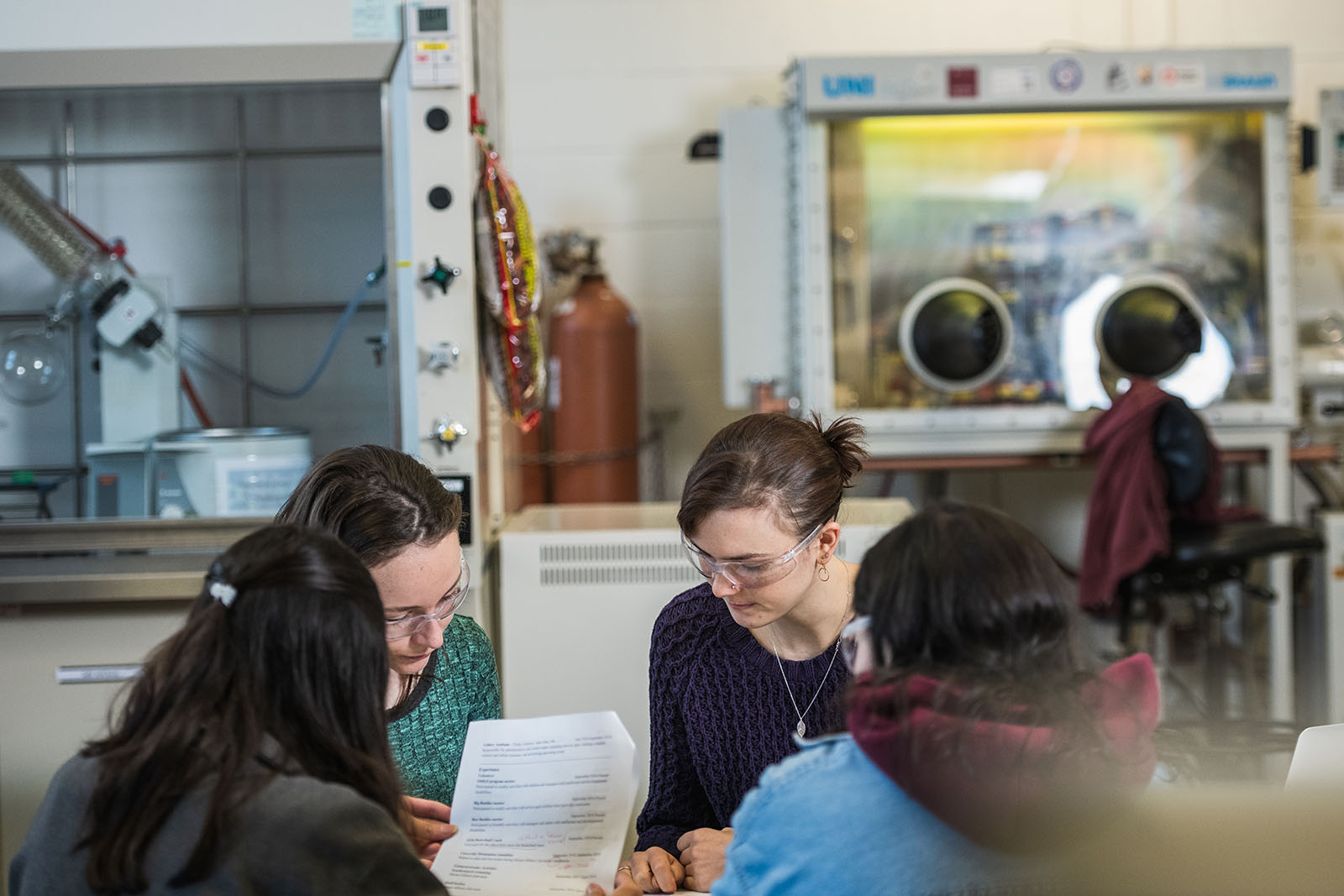
Why study chemistry?
Chemistry deals with structures, properties, reactions, and uses of substances in both living and non-living systems, increasing our understanding of the structure and behaviour of matter. By its nature, chemistry is interdisciplinary and occupies a central position among the sciences.
Society requires chemists to design, create, and measure new materials, drugs, and technologies, as well as to identify and understand molecules in our environment that are of potential significance to it.
An increasing number of governmental departments and agencies employ chemists in research and testing laboratories. Large science-based industries (petroleum refining, pharmaceuticals, electronics, materials, biotechnology) have both large and small companies throughout Canada. All employ chemists and chemical engineers in key operational roles and in production, research, sales, and development.
The teaching of chemistry in high school, technical institute, or university is also a rewarding way to contribute to the needs of society.
Program advisor: Glen Briand
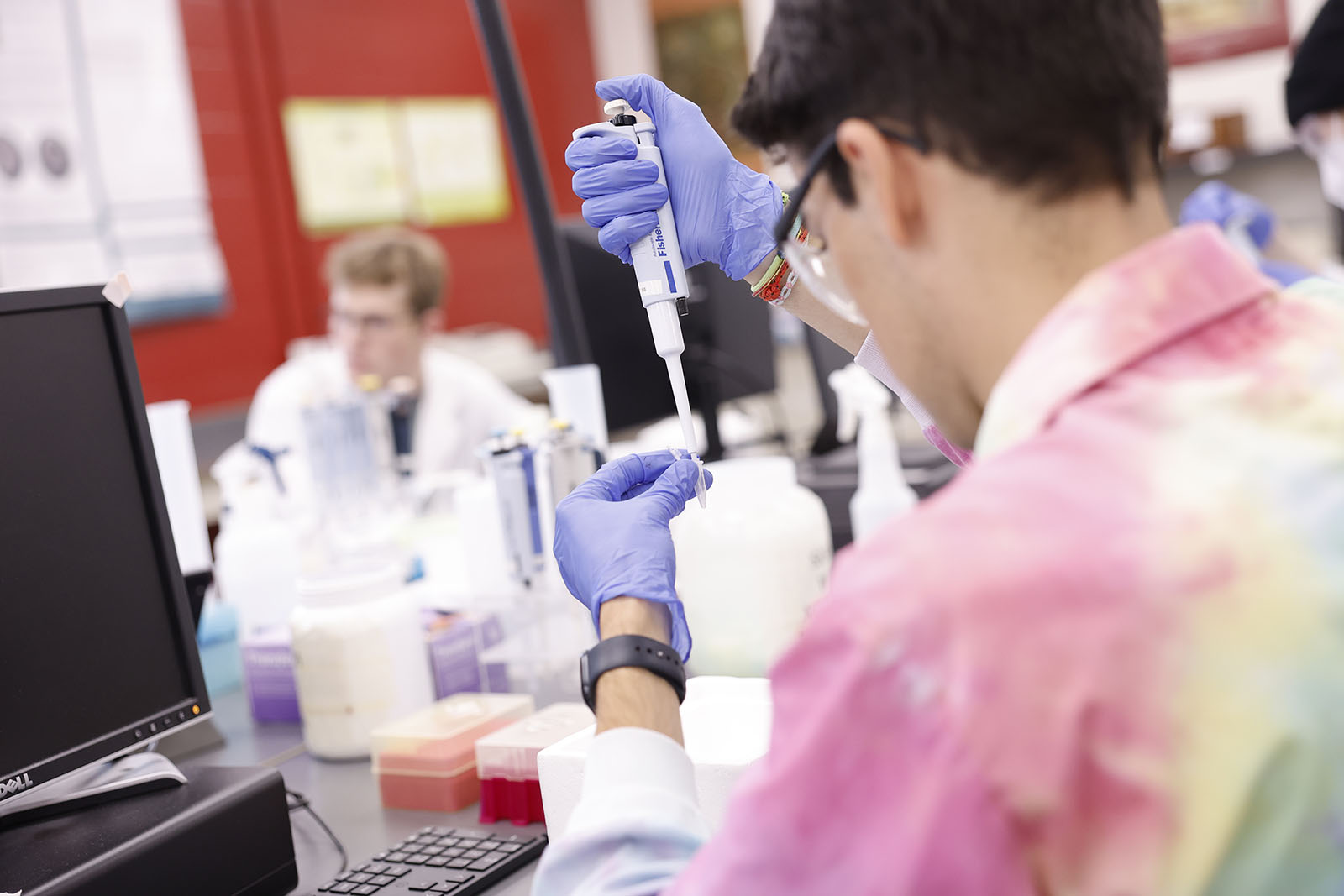
Why study biochemistry?
Biochemistry is an interdisciplinary science, linking chemistry and biology to increase our understanding of the fundamental chemical processes that facilitate life. It is an inherently mechanism-focused discipline.
Society requires biochemists to address problems in important areas of physiology, medicine, and biological responses to our changing environment.
Biochemists go on to careers in a wide variety of professional vocations including clinical, pharmaceutical, and fundamental research, healthcare, and government.
The teaching of biochemistry in a high school, technical institute, or university is also a rewarding way to contribute to the needs of society.
Program advisor: Jeffrey Waller
The undergraduate curriculum
In the Mount Allison Chemistry program, the subject matter of the several sub-divisions of chemistry is interrelated and integrated. The first-year program is designed to consolidate and elaborate on students' previous background in chemistry and biochemistry.
Students who have completed the International Baccalaureate chemistry program, "A" Level chemistry (U.K.), or the Advanced Placement Program (chemistry), should consult with the department head for possible credits and/or admission into second year courses.
In chemistry, the second and third-year program introduces and explores the core areas of analytical, organic, inorganic, and physical chemistry in depth. In biochemistry, the second and third year program introduces and explores the core areas of metabolism, protein biochemistry, signal transduction, and immunochemistry. These courses usually have small class sizes and often incorporate an hands-on laboratory component.
The fourth-year program offers students some choice and flexibility in their course selection. The curriculum covers advanced courses in a variety of areas of chemistry and biochemistry. In addition, students can embark in research-based courses such as Independent study (4951, 4953) courses for 3 credits or Honours specialization (see below).
Chemistry and biochemistry flow charts
Chemistry
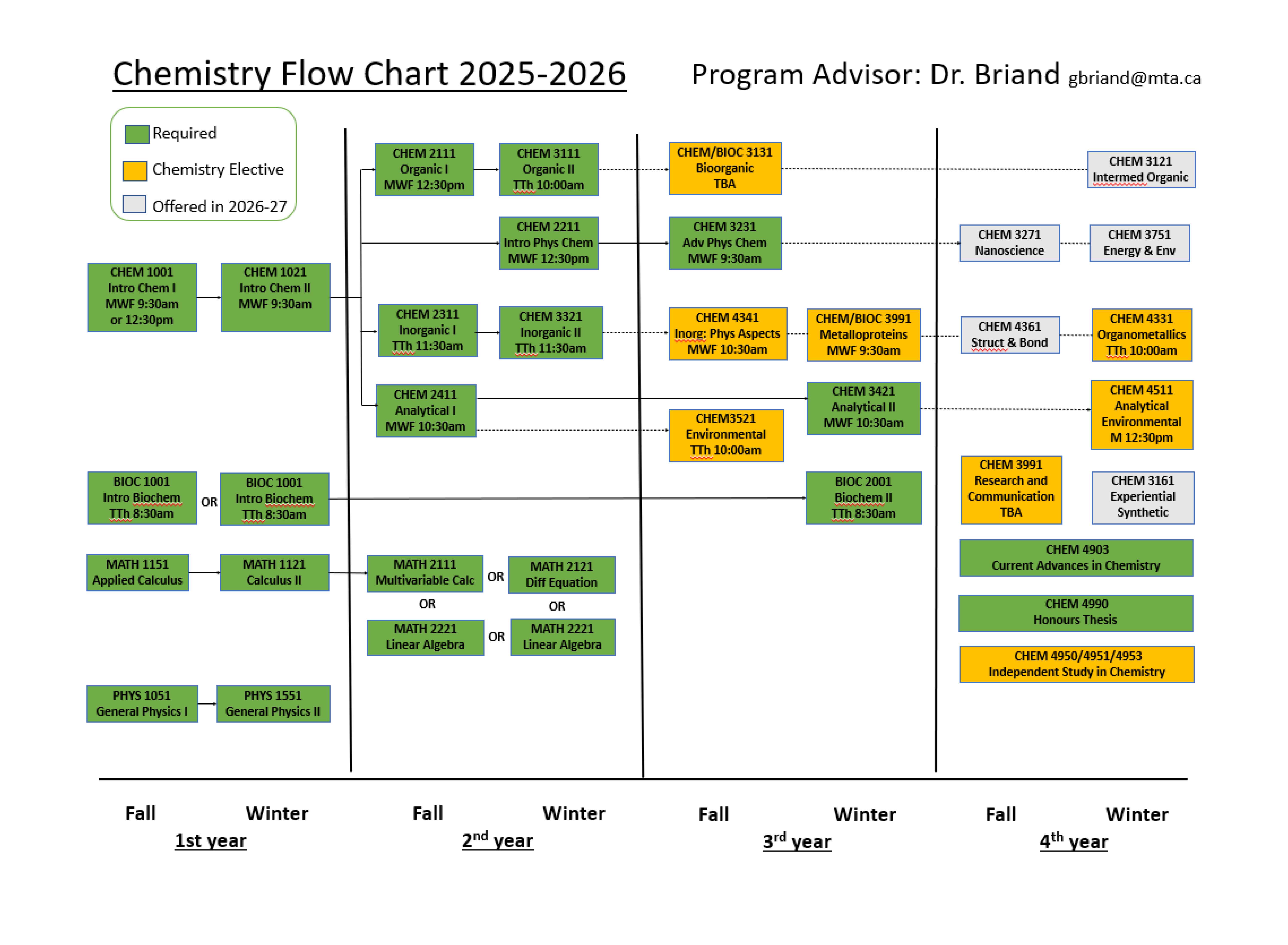
Biochemistry
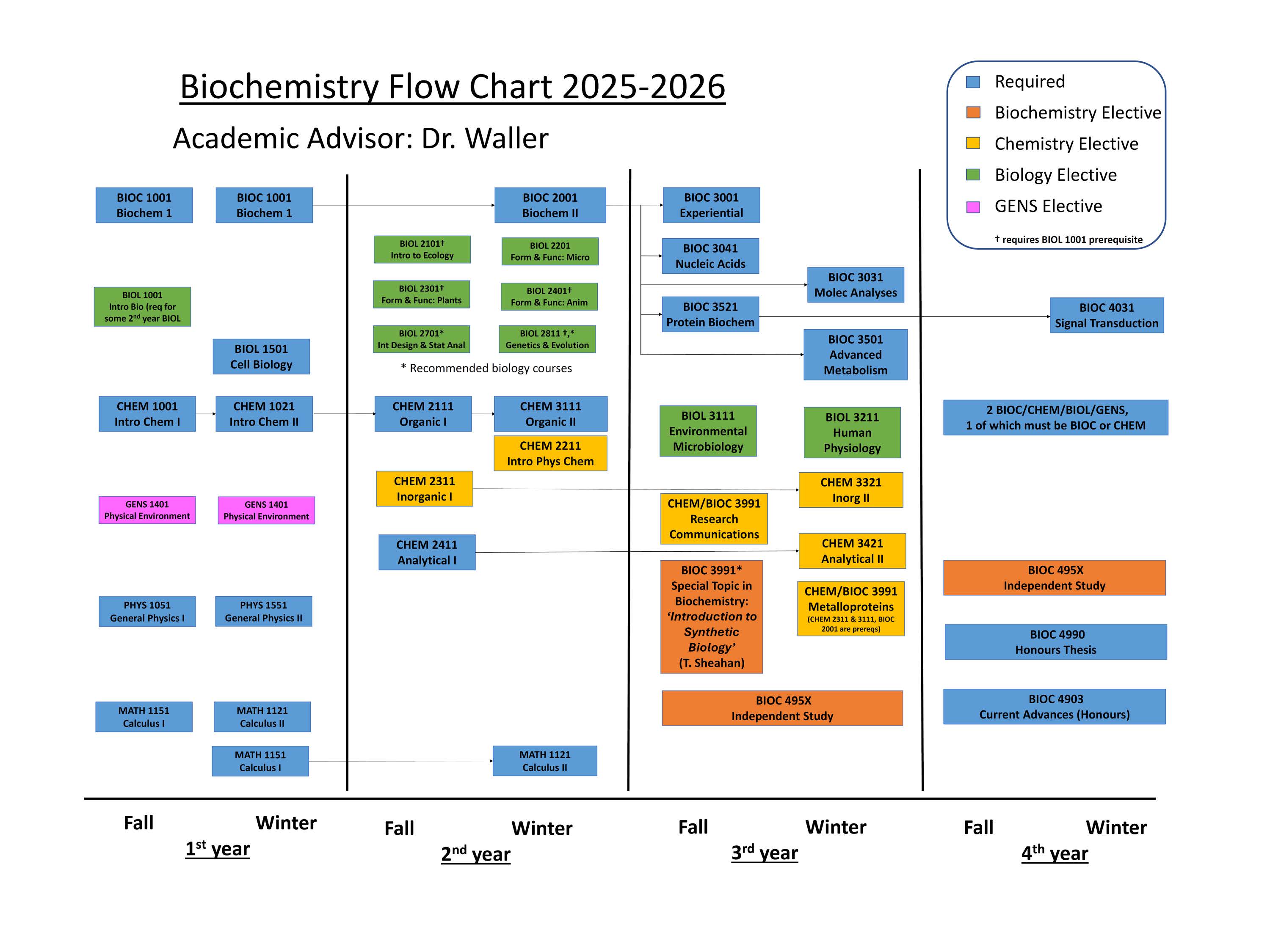
Honours Information Session
There was a Chemistry & Biochemistry Honours Information Session held on Thursday, October 23, 2025, at 4:30. The session was held in person in the Cragg Center (Barclay 215) as well as via MS Teams. If you would like to view the video of the presentation, please click the link Honours & Research Info Session 2025. Skip to minute "2:03" when the audio starts
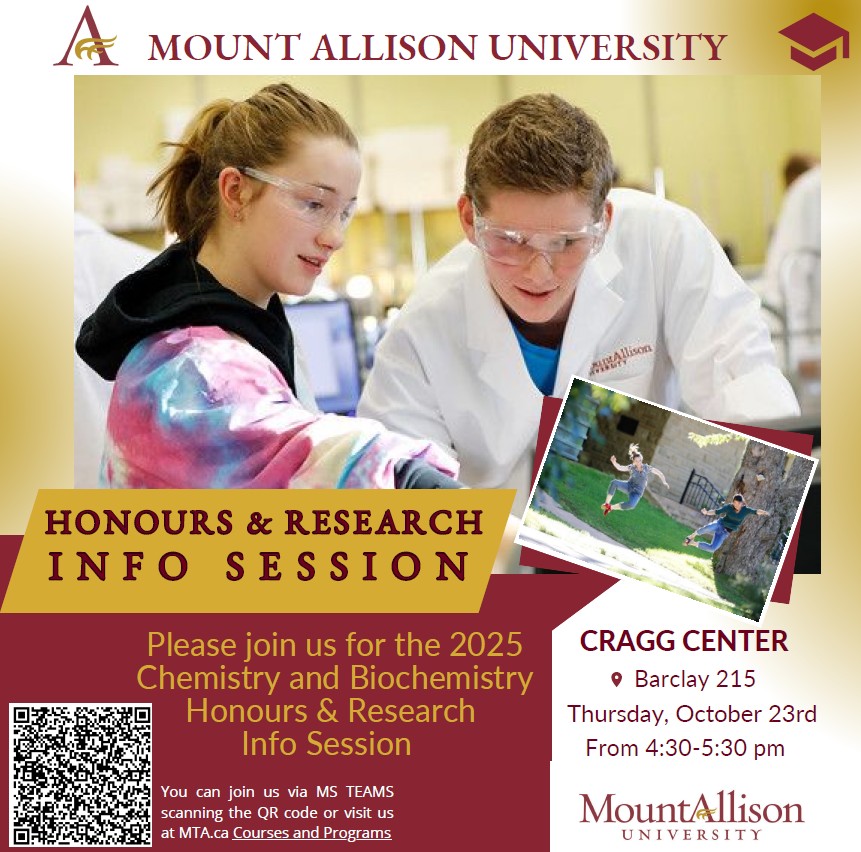
The Chemistry & Biochemistry honours program will involve an extensive experimental or theoretical study culminating in the writing of a thesis and oral presentation on Honours Day at the end of the winter term. The research will be conducted under the supervision of a faculty member and will be carried out during the honours year and the preceding summer months.
To apply for the honours program:
- Fill out the declaration to pursue honours form
- Fill out the potential honours candidates form by the last day of classes of the fall semester.
Honours general timeline
Third year
September-November: Identify potential research supervisors and meet to discuss research projects and opportunities. Preliminary information may be found on the faculty members’ webpages.
October: Attend the Department's honours information session.
By Dec. 1: Contact the honours co-ordinators to identify yourself as a potential honours candidate.
By Dec. 21: Complete the declaration to pursue honours form.
January: Department of Chemistry and Biochemistry Honours Committee considers applicants. Acceptance into the program is a privilege, not a right. A GPA of 3.0 is required to receive a BSc with honours. If accepted, the Department will register the candidates into CHEM/BIOC 4990 and the associated seminar course CHEM/BIOC 4903.
December/January: Discuss opportunities for summer research funding with your supervisor and prepare relevant applications for submission.
Fourth year
May-August: Although not a requirement, many honours students choose to work in the lab as summer research students throughout the summer preceding their fourth year. In this role, students conduct independent research to learn new laboratory skills and generate novel research findings.
September-March: Complete the required honours course work, laboratory experiments, and preparation of the written thesis.
Late March: Honours Research Day presentations.
Early April: Thesis submission.
Honours FAQs
Q: What is it?
A: You work independently on an original research question/problem in collaboration with a faculty member.
Q: Do I need to choose my own project?
A: No, but you can certainly have input into your project. You need to commit to a supervisor (and vice versa) and together you will come up with your project.
Q: Can I work on anything that interests me?
A: Your project usually needs to fall within the realm of your supervisor's research program.
Q: What is the first step?
A: You should make an appointment to visit potential supervisors and ask about their research during or before the fall term of your third year. Be prepared to tell faculty members about yourself.
Q: What are the important considerations in deciding on a project/supervisor?
A: You should keep an open mind. Once you take ownership of a project, you may be surprised about how much it interests you. You should think about:
- how much direct supervision you would like/require
- the working relationship you will have with your supervisor
- your goals — are you interested in potentially publishing your work, attending conferences?
- the type of research you might like to do
Q: What is the time commitment?
A: You may have the opportunity to begin research in May and work throughout the summer. Alternatively, your project begins in September. You should expect to spend several hours/week on thesis-related work.
Q: How are supervisor-student decisions made?
A: Once you have chatted to several potential advisors, you should let faculty know if you would like to work with them.
Q: What is BIOC/CHEM 4903?
A: As an honours student, you register in BIOC/CHEM 4990 (Thesis = 6 credits) and BIOC/CHEM 4903 (3 credits). Both are year-long courses. BIOC/CHEM 4903 (Current Advances) usually meets every second week. You engage in thesis-related work (e.g. seminars, discussions).
Q: Is it possible to do a minor?
A: Yes, it is usually no problem to have a minor with an honours. You may use any courses from your honours towards your minor (there are no cross-over limits).
Q: How am I graded?
A: You receive a grade for 4903 from the 4903 faculty member based on the work you do in this course. Your 4990 grade comes from your written thesis and a presentation you give on Honours Day in April. You need a B in BIOC/CHEM 4990 to gain honours. If this does not happen but you pass, you will be given 6 credits as BIOC/CHEM 4950.
Useful links
For more information, contact the Department Head (vmeli@mta.ca) and see the link to the Honours Information session above.

